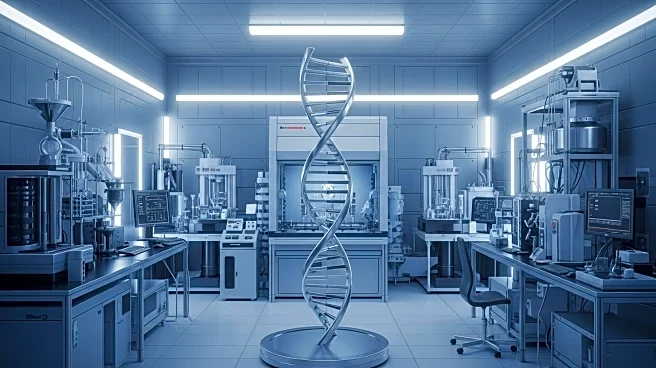What is the story about?
What's Happening?
Senator Todd Young, R-Ind., has expressed concerns over the United States falling behind in biotechnology development, particularly in comparison to China's advancements in gene editing and other technologies for battlefield applications. Young, along with other lawmakers, is advocating for increased investment in biotech as a national security priority and an economic driver. The Trump administration's cuts to scientific research funding have raised alarms among lawmakers, including Rep. Chrissy Houlahan, D-Pa., who co-founded the BIOTech Caucus. They argue that these cuts could hinder the U.S.'s ability to lead in manufacturing and technology. The National Security Commission on Emerging Biotechnology, led by Young, has made 49 recommendations to enhance U.S. biotech capabilities, including the development of biological sensors and dynamic biological camouflage for military use.
Why It's Important?
The push for increased biotech research funding is crucial for maintaining U.S. competitiveness in defense technology and manufacturing. As China continues to make strides in biotechnology, the U.S. risks losing its edge in critical areas such as bio-manufacturing and industrial applications. The potential benefits of biotech advancements include improved battlefield awareness, stealth capabilities, and life-saving medical innovations. The bipartisan support for initiatives like the CHIPS and Science Act demonstrates the importance of investing in technology independence. Failure to prioritize biotech research could have economic and strategic consequences, particularly for rural areas that stand to benefit from manufacturing opportunities.
What's Next?
Lawmakers are working to incorporate biotechnology measures into the National Defense Authorization Act, including a mandate for the Pentagon to develop a strategy for biotech efforts. The administration has the opportunity to support industrial policy through programs that benefit rural America economically. The political narrative around supporting rural America and bio-manufacturing could shift if the administration does not act, potentially impacting electoral support. The next steps involve balancing federal government streamlining with a vision for innovation and manufacturing growth.
Beyond the Headlines
The ethical implications of biotechnology in defense, such as gene editing for human performance, raise questions about the boundaries of scientific research and military applications. The potential for biotechnology to transform warfare and manufacturing underscores the need for careful consideration of its long-term impacts on society and global security dynamics.
















